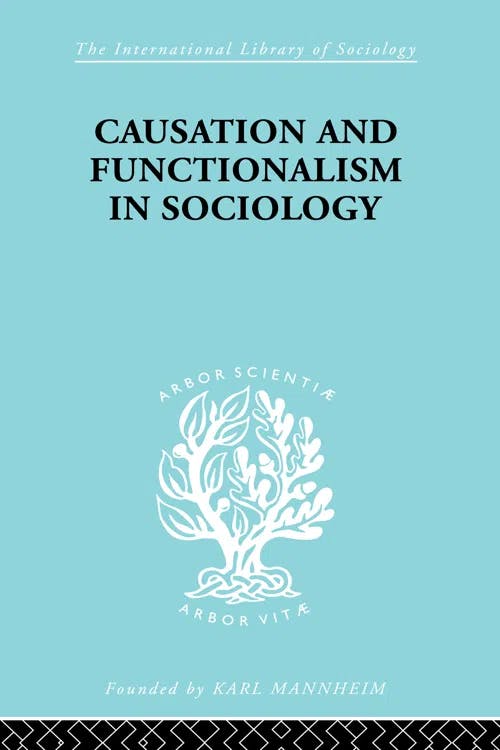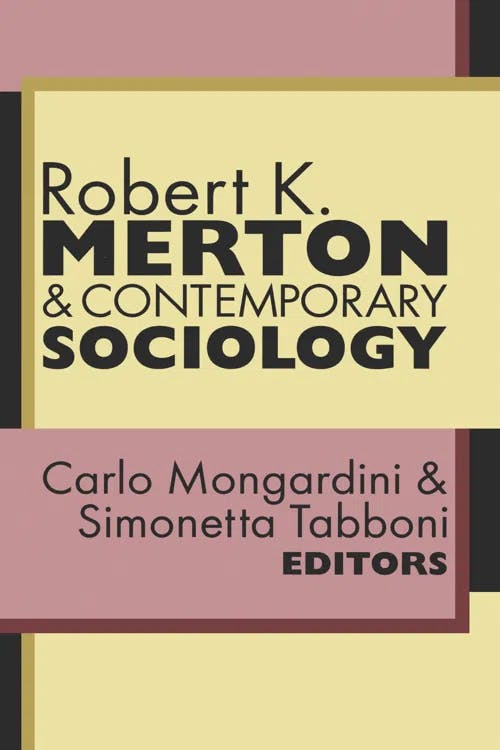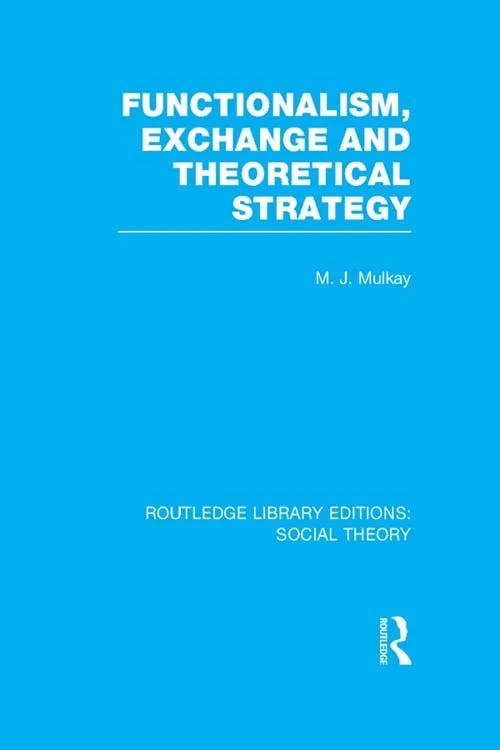What is Structural Functionalism?
MA, Gender Studies (London School of Economics & Political Science)
Date Published: 23.03.2023,
Last Updated: 02.08.2023
Share this article
Defining Structural Functionalism
Structural Functionalism (often referred to as Functionalism) is a theory on the framework of societies. Most popular as a theory in the 1940s, 1950s and 1960s, Structural Functionalism sought to conceptualize social structures as the sum of myriad connected parts. In Causation and Functionalism in Sociology, Wsevolod Isajiw wrote that:
“The question which functionalism tries to answer is how social phenomena can be treated as dynamically interdependent variables.” (1968)
Wsevolod W. Isajiw
“The question which functionalism tries to answer is how social phenomena can be treated as dynamically interdependent variables.” (1968)
Structural Functionalism argues that societies develop like organisms and, like in an organism, the components of a society all affect and interact with each-other in an interdependent manner. In terms of its academic application, Isajiw states:
“Functional analysis studies the functions which a structural item of the social system has for the state of the system as a whole, and how these functions bear on the structural item itself.” (1968)
Following this logic, Structural Functionalism suggests that social change occurs as an adaptive response to tension arising within a social system. This tension can occur within the social norms, institutions, roles or relationships that constitute a social system. For example, during the Great Depression in the USA in the 1930s, the significant economic downturns felt across the country prompted religious organisations to fill the gap for social and financial support. This adaptive response suggests one sector of a society relieves the tension that has been created by another - the religious organizations relieving the tension caused by rising economic struggle. Although there is a general consensus on this broad definition of Structural Functionalism, Sociological scholars conceptualized and debated over the specificities of Structural Functionalism throughout the early to mid 1900s.
American sociologist Talcott Parsons was one of the most prominent voices on this subject and is best known for both his work on Social Action Theory and the tenets of Structural Functionalism. Parsons is often credited with the conceptualisation of Structural Functionalism - although earlier scholars such as Auguste Comte and Herbert Spencer often alluded to concepts similar to Structural Functionalism in their writing. Parsons believed that societies had four needs which had to be met in order to function. These needs include adaptation, goal attainment, integration and latency (AGIL) (Izadi, Mohammadi, Nasekhian & Memar, 2020). We can break these four functions down in the following way:
Adaptation: The problem of acquiring sufficient resources.
Goal Attainment: The problem of settling and implementing goals.
Integration: The problem of maintaining cohesion and coordination between the components of the social system.
Latency (or ‘latent pattern maintenance’): The problem of creating, maintaining and transmitting the social system's specific culture and/or values.
Parsons believed that these functional requirements were met through the harmonious interaction of the components of a society- a society which was dependent on a moral consensus and a lack of social conflict.
Parson’s conceptualisation should be described as foundational; it was the framework for more specific and often refined conceptualisations during the mid-20th Century. Notably, sociologist Robert K. Merton wrote extensively on this subject - fundamentally agreeing with Parson’s theory but Merton wished to integrate more empirical research into what was originally a more abstracted theory. In Robert K. Merton and Contemporary Sociology, Carlo Mongardini writes the following of Merton’s perspective:
Merton refers to the claim of Bronislaw Malinowski… that “the functional view of culture insists therefore upon the principle that every type of civilization, every custom, material object, idea and belief fulfills some vital function.” Such functional analysis, furthermore, adheres to the thesis of the indispensability of social structures and processes. (2018) (emphasis our own)
Carlo Mongardini
Merton refers to the claim of Bronislaw Malinowski… that “the functional view of culture insists therefore upon the principle that every type of civilization, every custom, material object, idea and belief fulfills some vital function.” Such functional analysis, furthermore, adheres to the thesis of the indispensability of social structures and processes. (2018) (emphasis our own)
In making structural functionalism more empirical and applicable to research, Merton sought to create terms to explain how components of a society functioned together. For example, Mongardini notes Merton’s framing of religion as a function in society:
Religious beliefs have a dual function: they control social action and contribute to social integration. In other words, certain problems have to be solved in every society, and certain structural and cultural patterns are essential in order to do justice to these functions—to that of social integration, for example. (2018) (emphasis our own)
Merton’s broadening of functional analysis largely centered around the inclusion of these new terms for describing functions - acknowledging dual functionality was one factor, such as with religion. However, Merton is also credited with the introduction of ‘latent’ and ‘manifest’ functions, originally conceptualized outside of structural functionalism by Bronislaw Malinowski. Manifest functions were considered the intentional, recognisable consequences of a particular social pattern. Latent functions contrastingly, were any unrecognizable, unintentional or unanticipated consequences of a particular social pattern. Merton considered this introduction essential for differentiating how motives and outcomes vary within the context of a social outcome- and should be analyzed with this differentiation in mind.
Structural Functionalism is most often applied in the field of Sociology and Anthropology, as it is used to account for patterns and practices within the large social groups or societies. The majority of theorists credited with helping to develop Structural Functionalism as a theory were sociologists. Structural Functionalism must not be confused with Functionalism in Architecture, which is the principle that the design of buildings should be grounded solely in their purpose and function. It must also not be confused with Functionalism in International Relations, sometimes referred to as Mitranian Functionalism. This form of Functionalism emphasizes the dynamics and the importance of common interests between political states.
Real-World Examples of Structural Functionalism
Two examples of what Talcott Parsons would describe as ‘institutions’ within a society are formal education and family. These institutions are components of society which have a specific function(s). Each institution has its own specific and individual but interrelated function to maintain the stability of the social system as a whole. Each institution also depends on other institutions to function properly. As mentioned previously, Structural Functionalism operates on the notion that societies must have a ‘moral consensus’ - a general agreement amongst the members of a society about its values and principles. Sociologist Damian Milton said the following on the subject of implementing this consensus and the role of families as an institution:
Functionalists argue that this consensus of values is possible due to ‘socialisation’. Socialisation means the process by which individuals learn the norms and values of their given culture. Thus, the Family as an institution is seen by functionalists as vital for providing this function for individual family members and for society as a whole. (Milton, 2007) (emphasis our own)
According to Structural Functionalism, this socialisation is then bolstered and further developed in formal education. This formal education also allows parents in families to engage in economic labour whilst the caregiving needs of their children are met - thus tying families and formal education together as two institutions functioning in an individually specific yet interdependent arrangement with one another.
Criticisms of Structural Functionalism
Structural Functionalism reached its peak in popularity in the mid 1900s. From the 1960s onwards, sociologists and anthropologists began to criticize many of the tenets of Structural Functionalism. One of the key criticisms was that Parsons conceptualized Structural Functionalism through the context of the social practices he witnessed during World War II. During this period, “equilibrium and social order was crucial rather than social change” (Subedi, 2015). In Subedi’s writing it is noted that under the theory of Structural Functionalism, “Just like internal organs of a normal biological organism, society maintains its stability, order and progress only when social organs, structure and institutions coordinate and cooperate with each other (are in equilibrium) - NOT conflict with each other.”
Because of Parson’s social context being a time period in which equilibrium was considered paramount for the survival of society, his theory of Structural Functionalism may falsely represent how societies generally operate. Structural Functionalism’s suggestion that equilibrium comes from a lack of conflict has been criticized, with critics sometimes referring to Structural Functionalism instead as ‘consensus theory’. This is because Structural Functionalists argue that social change only happens within the pre-existing social institutions of a society in equilibrium, not through conflict. Structural functionalists also argue that this equilibrium often comes from said society being in general agreement about what their social norms, rules, values and regulations are. Structural Functionalism gave way to a focus on more conflict-oriented theories by the early 1980s.
Another criticism confronts how Structural Functionalism is limited in the social mechanisms it recognises in the building of societal relationships. In Functionalism, Exchange and Theoretical Strategy, sociologist Michael Mulkay highlights how the inflexibility of Structural Functionalism led to it being surpassed by theories which accounted more for the benefits and balances of social relationships:
For example, where the functional conceptual scheme was elaborated most comprehensively, as in Parsons' work, an increasingly important role had been assigned to the concept of exchange; and, as can be seen in Merton's analyses, where functionalism was more concerned with accounting for concrete phenomena the notion of social exchange had often been implied. But, despite this tendency for the idea of social exchange to recur in functional analyses, it necessarily remained a supplementary rather than a central concept. Functional analysis was so intricately organized around the concept of social function that its adherents necessarily failed to develop all the theoretical implications of the idea of social exchange. As a consequence, explicit exchange theory-that is, the theoretical framework which uses the notion of exchange as its central organizing principle-was eventually formulated only by those openly critical of functionalism. (2014) (emphasis our own)
Michael Mulkay
For example, where the functional conceptual scheme was elaborated most comprehensively, as in Parsons' work, an increasingly important role had been assigned to the concept of exchange; and, as can be seen in Merton's analyses, where functionalism was more concerned with accounting for concrete phenomena the notion of social exchange had often been implied. But, despite this tendency for the idea of social exchange to recur in functional analyses, it necessarily remained a supplementary rather than a central concept. Functional analysis was so intricately organized around the concept of social function that its adherents necessarily failed to develop all the theoretical implications of the idea of social exchange. As a consequence, explicit exchange theory-that is, the theoretical framework which uses the notion of exchange as its central organizing principle-was eventually formulated only by those openly critical of functionalism. (2014) (emphasis our own)
Social Exchange Theory argued that, beyond the functions an individual or institution had in society, relationships were also built on a symbiotic foundation where the stability of a social relationship is dependent on the ‘balance of exchange’. Structural Functionalism neglects to address how, for example, people choose romantic partners to form long term relationships with. Social Exchange Theory, however, allows us to understand how the balance of ‘costs’ (actions to maintain relationship) and ‘benefits’ (e.g. security, social approval, access to goods or services) may impact the formation and maintenance of social bonds.
Although Structural Functionalism is rarely applied in isolation to contemporary sociological and anthropological research, many facets of this theory still hold scientific value when used in conjunction with other theories, such as Social Exchange Theory. Although its applicability is confined by social context, Structural Functionalism endures as a valuable lens through which to assess wider social structures and the dynamics that exist within the components of them. Through Structural Functionalism, the utility of concepts such as latent and manifest functions has been demonstrated- and these concepts need not be applied alongside all the pre-existing tenets of Structural Functionalist theory. This theory represents sociology’s first attempts to explain how individuals and the values they hold can operate as a whole- and its limitations have kindled progressive and dynamic schools of thought in sociology and across the social sciences.
Significant texts on Structural Functionalism
Many texts on Structural Functionalism tie the theory to other Sociological theories, such as Parson’s Social Action Theory. The interconnections of Parson’s theories can be best understood by reading Toward a General Theory of Action: Theoretical Foundations for the Social Sciences by Parsons and his colleague Edward Shils. This text is interdisciplinary in nature and spans the social sciences to connect theories together under a behaviour-focused approach to understanding social structures and functions.
Given the developments on this subject after Parson’s initial conception of the theory, The Idea of Social Structure: Papers in Honor of Robert K. Merton by Lewis Coser is a very useful compilation of papers which explore Merton’s more ‘refined’ approach to Parson’s take on Structural Functionalism. These texts convey an increased awareness of the sociopolitical aspects of inequality and how they drive social change.
Finally, if you are interested in exploring the pre-Parson origins of Structural Functionalism, Herbert Spencer and Social Theory by John Offer is hugely insightful. 19th Century philosopher Herbert Spencer was the first scholar to make comparisons between the functioning of a human body and how a society operates as a sum of parts. Often credited as the first sociological functionalist during the development of modern Sociology (Turner, 1985), Spencer’s writings often bridged the gaps between the disciplines of Sociology, Psychology and Philosophy.
Further Structural Functionalism resources & reading on Perlego
Concepts and the Social Order: Robert K. Merton and the Future of Sociology - Yehuda Elkana
Talcott Parsons: Despair and Modernity - Shaun Best
Structure and Social Action: On Constituting and Connecting Social Worlds - John Scott
The Consensus-Conflict Debate: Form and Content in Social Theories - Thomas J. Bernard
Bibliography
Coser, L. A. (Ed.). (2017). The idea of social structure: Papers in honor of Robert K. Merton. Routledge.
Izadi, A., Mohammadi, M., Nasekhian, S., & Memar, S. (2020). Structural functionalism, social sustainability and the historic environment: A role for theory in urban regeneration. The Historic Environment: Policy & Practice, 11(2-3), 158-180.
Milton, D. (2007). Sociological theory: an introduction to Functionalism.
Offer, J. (2010). Herbert Spencer and social theory. Springer.
Parsons, T., & Shils, E. A. (2017). Toward a general theory of action: Theoretical foundations for the social sciences. Routledge.
Subedi, D. P. (2015). Structural Functional Perspective in Sociology. Retrieved June, 3, 2015.
MA, Gender Studies (London School of Economics & Political Science)
Georgie Williams is a deferred doctoral student in the field of Social Justice at University College Dublin and founder of gender & sexuality research hub, /Queer. Georgie’s research predominantly focuses on the development of gender and sexuality related social practices in post-colonial countries and the application of reflexive feminist methodologies to anthropological and sociological field research.



